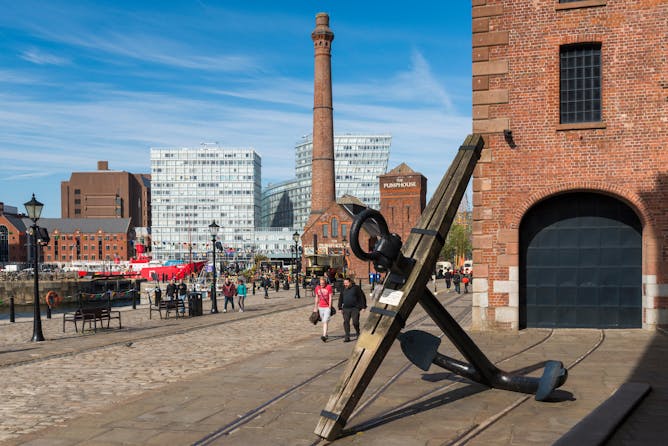|
|
|
|
After a decade in the balance, Liverpool’s world heritage status has been revoked. At its 44th annual conference, the Unesco World Heritage International Committee voted to demote Liverpool’s city centre and waterfront site. The United Nations organisation cites what appear to be irreconcilable differences on how the city should develop around its heritage.
Preserving that is of the greatest importance. Liverpool, after all, is not just a handsome city that played a key role in the UK’s development, but was also at the heart of the international mercantile system of the 18th and 19th centuries and a centre for the darkest aspects of empire. The transatlantic slave trade remains written into its waters.
The row between the city and the UN, however, is about what Liverpool is to be, now. As Michael Parkinson, who has studied the city for 40 years, writes, it cannot be seen as a museum or a monument. Decades of socio-economic decline and tenacious renaissance have seen docks abandoned, refilled and dreamt upon. Bramley Dock is to house Everton FC’s new home, bringing in jobs, funds and fans. Will Unesco’s deletion hamper the city’s bid for
renewal or spur it along?
In fights of a different magnitude, research has thankfully found COVID vaccines to still be effective against fast-spreading new variants, and more worryingly that racism in Scotland may be more prevalent
than expected.
|
Dale Berning Sawa
Acting commissioning editor, Cities and Young People
|

|
|

Liverpool’s challenge has been to restore its historic docklands while investing in contemporary city life.
incamerastock / Alamy Stock Photo
Michael Parkinson, University of Liverpool
Preserving the cultural heritage of a city like Liverpool has to be reconciled with investing in its residents' futures.
|

NIAID/Wikimedia Commons
Zania Stamataki, University of Birmingham
A French study found a four to sixfold reduction in neutralisation against the delta variant compared with the alpha (Kent) variant.
|

Alexa Zari/Shutterstock
Marcus Nicolson, Glasgow Caledonian University
A recent study reveals that most Muslims believe Islamophobia is getting worse in Scotland - contradicting the country's perception of itself as a tolerant nation.
|
Politics + Society
|
-
Olivia Stevenson, UCL; Ann Phoenix, UCL; Siobhan Morris, UCL
The UK government's plan to 'build back better' can only work if we understand what that means to different populations.
-
Peter William Walsh, University of Oxford
Data from Oxford University shows UK asylum applications are proportionally lower than Cyprus, Luxembourg and Iceland.
-
Ronan McCrea, UCL
An EU court's ruling on religious freedom in the workplace demonstrates the perils of legislating for 27 member states.
-
Karin Wahl-Jorgensen, Cardiff University
Public interest disclosures are necessary in a functioning democracy. These reforms would make it harder to hold power to account.
-
Stephen Clear, Bangor University
Appointing ministers who aren't MPs or lords would weaken parliament's ability to hold the government to account.
|
|
Business + Economy
|
-
Catarina Araya Cardoso, University of Westminster
Green bonds also encourage environmental investment elsewhere.
-
Helen Hodgetts, Cardiff Metropolitan University; Nick Perham, Cardiff Metropolitan University
Your brain may have got used to working from home, here's how to transition back to the office.
-
Jennifer Simnett, University of Reading; Filipe Manuel Morais, University of Reading
Following collapses like cake shop chain Patisserie Valerie, the UK government is trying to toughen up the rules around financial reporting.
|
|
Environment + Energy
|
-
Hannah Cloke, University of Reading
I helped forecast disaster – but nothing prepared for me what happened next.
-
Kelly Parsons, University of Hertfordshire; David Barling, University of Hertfordshire
A new report calls for a greener and fairer food system in England.
|
|
Science + Technology
|
-
Ethem Ilbiz, University of South Wales; Christian Kaunert, University of South Wales
Hybrid warfare is becoming increasingly sophisticated. Governments and vulnerable organisations need to adapt quickly to respond to the threat.
-
Michael Locke McLendon, California State University, Los Angeles
John Locke and John Stuart Mill don't provide much in the way of justification for ignoring public health advice in a pandemic. Mikhail Bakunin, however...
|
|
Health + Medicine
|
-
Anthony Bain, University of Windsor
Heat stroke is a danger in extreme temperatures, but a major risk factor for dying during a heat wave is cardiovascular disease and other pre-existing health conditions.
|
|
| |
Featured events
|

|
Whiteknights House, PO Box 217, Reading, Reading, RG6 6AH, United Kingdom of Great Britain and Northern Ireland — University of Reading
|

|
Sustainable Places Research Institute, Cardiff University, Cardiff, Cardiff [Caerdydd GB-CRD], CF10 3BA, United Kingdom of Great Britain and Northern Ireland — Cardiff University
|

|
University of Essex, Wivenhoe Park, Colchester, Essex, CO4 3SQ, United Kingdom of Great Britain and Northern Ireland — University of Essex
|
|
|
|
| |
| |
| |
| |
| |
|
|
|
|
|
|
|